Graham Reid | | 8 min read
Love Me Do (2023 remix)
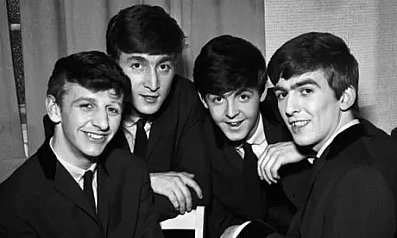
The release of the Beatles "final" song Now And Then came with -- on CD, vinyl and digital release -- a reminder of where they started, the 2023 remix of their first single Love Me Do.
For decades it has seemed a modest beginning but . . .
To understand why the Beatles were such a breakthrough in popular music we need only look at the year before their arrival in 1963 with Love Me Do.
It was kinda dull.
By the early Sixties, the excitement of the first wave of Fifties rock'n'roll from America (epitomised by Elvis Presley, Chuck Berry, Buddy Holly, Little Richard and others) had dissipated.
In Britain the big star was still Cliff Richard who, in 1958, had recorded Move It at Abbey Road studios in London (see here), the first British rock'n'roll song of any merit. But Richard's career had become more conservative and (like Elvis) he was making a nice living singing nice tame ballads and playing the nice guy in nice movies like The Young Ones.
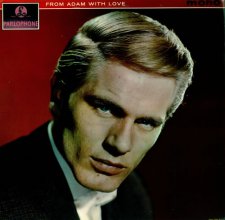 Like Elvis he'd started in movies making a decent impression -- as an ambitious but immature young pop singer in Expresso Bongo in 1960 -- but opted for the safe route.
Like Elvis he'd started in movies making a decent impression -- as an ambitious but immature young pop singer in Expresso Bongo in 1960 -- but opted for the safe route.
Elsewhere, under the impresario Larry Parnes, good looking and often working class boys were picked up and given new names, some soft or archetypal rock'n'roll songs to sing and sent out on tours to appeal to teenage girls.
Among them were Billy Fury (very good, from Liverpool), Adam Faith (above, who adopted Buddy Holly's hicupping style), Vince Eager, Duffy Power (who became a respected figure in blues, died 2014), Marty Wilde, Georgie Fame (went on to a jazz and blues career), Johnny Gentle . . .
Pop was a product.
You can read about the manufacturing of pretty boy pop stars in the USA and UK here.
The top 10 best selling singles of 1962 tell the story . . .
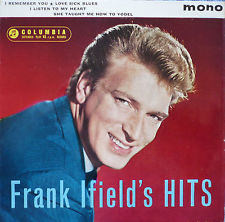 1: Frank Ifield, I Remember You (UK artist, very catchy hit, falsetto and harmonica are the hooks)
1: Frank Ifield, I Remember You (UK artist, very catchy hit, falsetto and harmonica are the hooks)
I Remember You
2: Mr Acker Bilk, Stranger On The Shore (UK. MOR jazz tune, lovely. Bilk and his band wore waistcoats and bowler hats)
Stranger on the Shore
3: The Shadows, Wonderful Land (UK. Cliff Richard's backing band who had a separate career playing instrumentals)
Wonderful Land
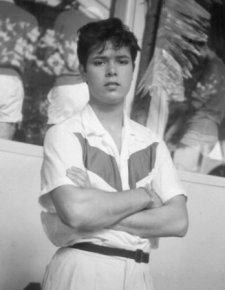 4: Cliff Richard, The Young Ones (UK. The theme to the movie of the same name, as we shall see)
4: Cliff Richard, The Young Ones (UK. The theme to the movie of the same name, as we shall see)
5: Elvis Presley, Can't Help Falling In Love / Rock-A-Hula Baby (USA. Elvis in ballad mode on side one, in slightly tame rock'n'roll mode on the flip side)
Can't Help Falling In Love
6: The Tornados, Telstar (UK. Perhaps the most interesting and innovative entry, a beautifully produced instrumental by Joe Meek which caught the craze for space, sputniks and rockets. Instrumental groups were very popular).
Telstar
7: Elvis Presley, Good Luck Charm (USA. Another easy listening Elvis song)
8: Chubby Checker, Let's Twist Again (USA. He'd had a big hit covering Hank Ballard's The Twist from '58 so it was time to twist again.)
9: Frank Ifield, Lovesick Blues (UK. The chart-topper again, an uptempo but unexceptional song with his distinctive signature "yodel")
Lovesick Blues
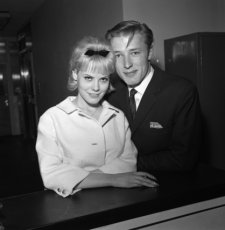 10: Mike Sarne and Wendy Richards, Come Outside (UK,. A novelty comedy song in mock-Cockney)
10: Mike Sarne and Wendy Richards, Come Outside (UK,. A novelty comedy song in mock-Cockney)
Come Outside
Get the picture?
Here's the picture . . .
Here's Cliff Richard from the '61 movie The Young Ones.
He is Mr Nice. Mr Sensitive. Mr Good-with-Kids etc.
And the song is saying " Darling, we're the young ones and young ones shouldn't be afraid to live, love, while the flame is strong. 'Cause we may not be the young ones very long . . . And some day when the years have flown. Darling, then we'll teach the young ones of our own".
Youth is fleeting, soon we will settle down and be responsible adults?
.
But something was happening away from the spotlight: The Beatles . . . in Hamburg and Liverpool.
In late 1960, as the Silver Beetles, they were hired by impresario Larry Parnes for a short tour of Scotland backing Johnny Gentle. But mostly they intermittently played clubs and halls around Liverpool. They could rarely keep a drummer for more than a show or two (they also weren't very good by all accounts) but eventually Pete Best joined because they needed someone for their residency in Hamburg in August 1960.
From March to July 1961 they played at the Top Ten in Hamburg and also went into a recording studio for the first time. They backed an English singer Tony Sheridan on a number of songs (notably My Bonnie, a traditional British song which often appealed to sailors, given an upbeat rock'n'roll treatment) and they also recorded an instrumental credited to Harrison-Lennon Cry for a Shadow very much influenced by the Shadows, obviously but also a confident piece of playing by the very young Harrison.
And this, another old song, but which for the first time we hear John Lennon on a lead vocal. And as with My Bonnie the song is given a rocked up treatment.
Ain't She Sweet
My Bonnie: Tony Sheridan vocals, Beatles backing
Cry for a Shadow, the Beatles
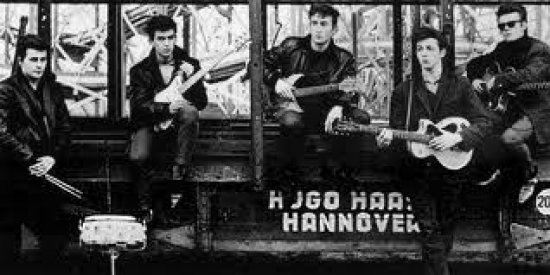
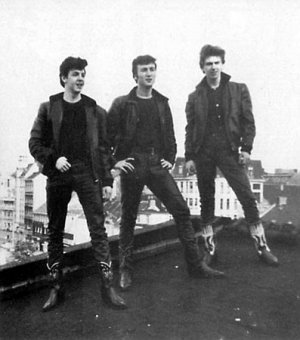 Their Hamburg songs in the studio might not have been up to much, but at least they had been in a studio and that alone gave them confidence about what was to follow.
Their Hamburg songs in the studio might not have been up to much, but at least they had been in a studio and that alone gave them confidence about what was to follow.
And during this period they learned and covered as much music as they could to entertain the crowd and to fill the lengthy sets. Among the songs they sang were plenty of Elvis, Chuck Berry, Little Richard, Ray Charles, early Motown, chart songs like Frank Ifield's I Remember You, standards, German songs . . .
(Check this out)
Here they are recorded in 1962 at the Star Club.
Roll Over Beethoven (singer Harrison)/Hippy Hippy Shake (McCartney)
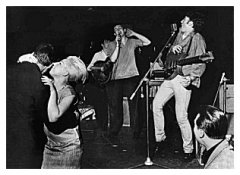
In Hamburg they entertained, got drunk, took pills to stay awake . . . and started to become a band.
John Lennon: "I grew up in Hamburg, not Liverpool."
Paul McCartney: "Hamburg totally wrecked us. I remember getting home to England and my dad thought I was half-dead. I looked like a skeleton, I hadn't noticed the change, I'd been having such a ball!"
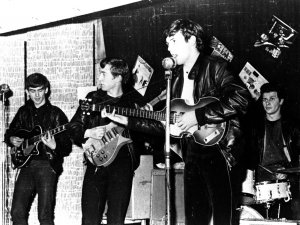
In Hamburg (see here), they dressed tough, often sounded tough and when they came back to Liverpool many people thought they were a German band.
September '61 The Beatles play their debut gig at the Cavern, Liverpool. They continue to play the Cavern (a residency for lunchtimes and evenings, playing almost 300 sets there) and other local venues.
They got even better.
They had amassed hundreds of hours of playing experience in Hamburg and Liverpool during which time they had learned chords, harmony vocals, how to play . . . and how songs worked because they had to learn dozens and dozens just to fill the hours on stage. They were a band.
(A recent accurate assessment put their total playing hours in Hamburg over their four visits at around 1200 playing hours, which averages out to over three hours a night every night for a year.
December 61 — At a meeting with the Beatles, Liverpudlian businessman Brian Epsteinoffers to become their manager. Lennon accepts on behalf of the group. He puts them in suits.
1962: THE YEAR THINGS START TO HAPPEN FOR THE BEATLES
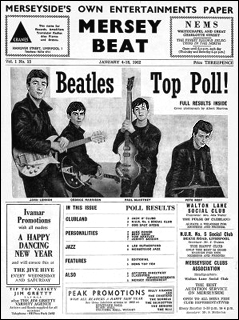 January 62 — The Beatles are auditioned by Decca A&R man, Dick Rowe, in West Hampstead, London. Rowe enters the history books with the famous utterance — "Go back to Liverpool, Mr. Epstein. Groups with guitars are out."
January 62 — The Beatles are auditioned by Decca A&R man, Dick Rowe, in West Hampstead, London. Rowe enters the history books with the famous utterance — "Go back to Liverpool, Mr. Epstein. Groups with guitars are out."
This comment has subsequently been disputed and it appears was made up to add to the Beatle mythology. The fact is the Beatles' audition was very poor. They were hung-over, nervous and it was freezing cold. They also made some very poor choices of material to perform, not the least the gimmicky Three Cool Cats.
Or this one originally by the Coasters notably mostly for Harrison's terrible guitar solo.
Searching, recorded for Decca on January 1, 1962
But the same month they top the Mersey Beat (music paper) poll as the most popular group in Liverpool (and there were hundreds of groups working)
March 62 - While Epstein tries to get them a recording contract he also manages to get them onto BBC radio shows (and between March 62 and June 65 they make 275 recordings of 88 songs. See here.) So by the end of '62 they had performed live (in clubs, and a couple of times for the BBC radio) and had been in recording studios (Hamburg, Decca) a lot more than any of their peers.
June 62 — The Beatles audition for producer George Martin at EMI, Abbey Road, London.
August 62 — Ringo Starr joins the Beatles ousting Pete Best, playing with them at the Horticultural Society Dance in Birkenhead, Lancashire.
September 62 — The Beatles record "Love Me Do," with session drummer Andy White standing in for Ringo. It is writen by Lennon and McCartney.
Norman Smith (Engineer) — Ringo had only just joined the group when we attempted "Love Me Do," so we brought in a session drummer. After that, it was always Ringo.
October 62 — "Love Me Do" is released as the first Beatles single.
December 62 — "Love Me Do" peaks at No. 17 on the U.K. chart.
So here's the Beatles with Love Me Do from late '62 . . . and by then they were ready to go.
the legend begins, but it's only a little promising
Simple lyrics and melody, Lennon playing his stolen harmonica in a way that isn't blues but seems borrowed from the way dockside workers would play it.
He said it was a handy instrument to be able to play if you were in prison (and was unashamedly borrowing the harmonica style from Frank Ifield's I Remember You, the Beatles were great borrowers, copyists and thieves as much as original songwriters).
Could the chords or lyrics be any more simple?
And the rhyme scheme (the sound of the end of the line) is also simple: do (a) you (a) true (a) do (a); love (b) you (a), love (b), you (a)
Love Me Do (alternate take)
.
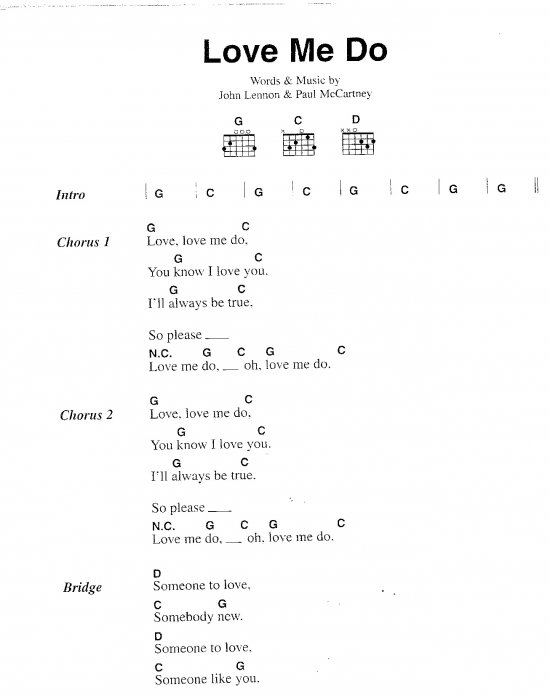
.
HOWEVER . . from Revolution in the Head by Ian MacDonald
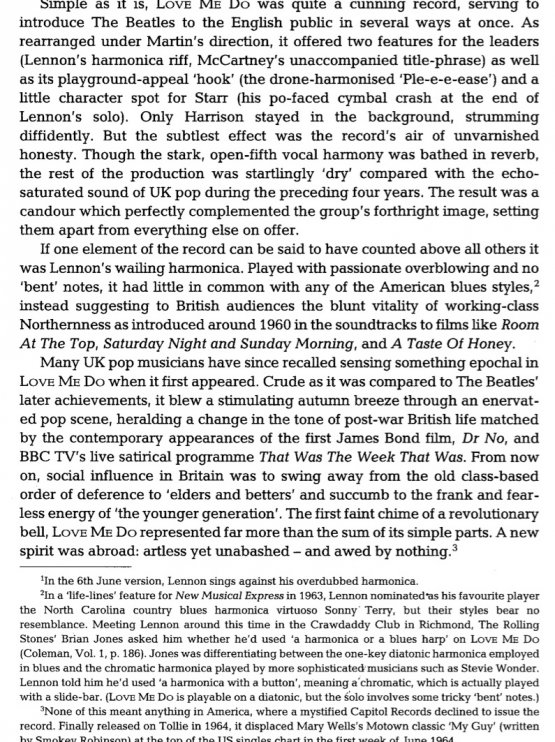
And with Love Me Do crawling up the charts they record a new single Please Please Me in November 1962.
It is a much better and more mature song. It's another Lennon-McCartney original. And their first number one.
Please Please Me, recorded November 26, 1962
AND AWAY WE GO . . . into Beatlemania


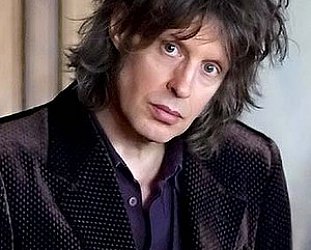
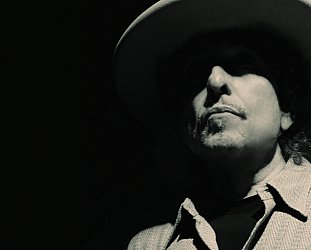

post a comment